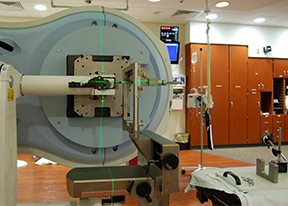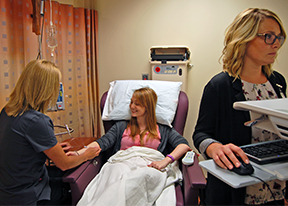What procedures do you do in your clinic?
 We have incredibly strong physics support, which allows us to do a wide variety of special procedures such as: low dose rate brachytherapy for prostate cancer, high dose rate brachytherapy for gynecologic cancers, intraoperative radiation therapy for breast cancer, stereotactic radiosurgery for intracranial lesions, frameless stereotactic radiotherapy, stereotactic body radiosurgery for liver and lung tumors, gated treatment delivery, conebeam CT for tumor localization, total body radiation therapy, and total skin radiation therapy.
We have incredibly strong physics support, which allows us to do a wide variety of special procedures such as: low dose rate brachytherapy for prostate cancer, high dose rate brachytherapy for gynecologic cancers, intraoperative radiation therapy for breast cancer, stereotactic radiosurgery for intracranial lesions, frameless stereotactic radiotherapy, stereotactic body radiosurgery for liver and lung tumors, gated treatment delivery, conebeam CT for tumor localization, total body radiation therapy, and total skin radiation therapy.
Is there sufficient patient volume so that I can have multiple exposures to a variety of conditions?
- One of the strengths of our residency program is that we see a wide variety of cases. We are fortunate to work in an excellent hospital with strong programs in multiple disciplines, such as Otolaryngology, Neurosurgery, and Medical Oncology to name a few. These departments see patients from all over Eastern Iowa, and those patients are then subsequently referred to our department for radiation therapy. We typically have 60 – 90 patients under treatment at any time.
Do I have to rotate outside UI Hospitals & Clinics to fulfill requirements?
- There are enough brachytherapy and pediatric cases to fulfill requirements for board certification. If residents are interested in additional experience in these areas, outside rotations can be arranged.
What's the call schedule like?
- Residents take call several times throughout the year for 1 week. Occasionally, residents are needed to cover the clinic briefly on Saturday or Sunday mornings. Rarely, residents are called during the night to emergently treat a patient.
Do you have a research project requirement for graduation?
- Yes. Not only do we have a research project requirement, but we have a research curriculum in the first two years of residency that helps strengthen and promote research skills while giving residents dedicated time to focus on their projects. Our residents have been very successful and productive in their research efforts and have all been accepted to present a poster at our national specialty conference, ASTRO. Additionally, residents can choose a research pathway in their last two years if interested.
Are residents involved in any clinical trials/protocols?
 We encourage all residents to be involved in clinical trials. We try to tailor residency to a particular resident’s individual needs and interests. Residents who are interested in a career in academic Radiation Oncology will likely opt for our Research or Holman Pathways. Other residents interested in private practice will also have ongoing research projects, but will focus more on developing their expertise on our Clinical Pathway.
We encourage all residents to be involved in clinical trials. We try to tailor residency to a particular resident’s individual needs and interests. Residents who are interested in a career in academic Radiation Oncology will likely opt for our Research or Holman Pathways. Other residents interested in private practice will also have ongoing research projects, but will focus more on developing their expertise on our Clinical Pathway.
What's Iowa got that other programs don't?
- State-of-the-art technology
- Individualized, innovative and integrative curriculum
- Nationally and internationally recognized faculty leaders in the fields of Radiation Oncology, Medical Physics and Free Radical and Radiation Biology
- A dedicated Education Team as well as Clinical Research Team
- Iowa City is a highly intellectual community with premier arts events that are accessible to residents in terms of cost and location
- We have an outstanding school system for children in grades K-12
- A great training program and a high quality of life at an affordable price
- Great benefits